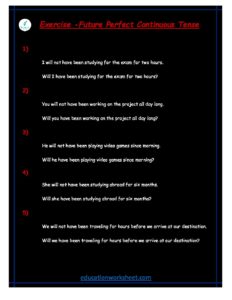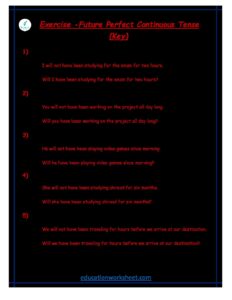Future Perfect Tense affirmative examples
Future Perfect Tense affirmative examples
Definition of the Future Perfect Tense:
The future perfect tense is formed by using the future auxiliary verb “will have” followed by the past participle of the main verb. This construction indicates an action or event that will be completed or perfected before a specified time in the future. The formula for creating affirmative sentences in the future perfect tense is as follows:
Subject + will have + past participle of the main verb
Now, let’s delve deeper into the concept of the future perfect tense by providing a comprehensive understanding through examples:
Future Perfect Tense Affirmative Examples:

- I will have completed my homework by the time you arrive.
- In this sentence, “will have completed” indicates that the action of completing homework will be finished before the specified time, which is when the person arrives.
- By the end of this year, they will have celebrated their 25th wedding anniversary.
- Here, “will have celebrated” conveys that the 25th wedding anniversary will have been celebrated before the year concludes.
- She will have read the entire book before the book club meeting.
- “Will have read” shows that reading the entire book is expected to be finished before the book club meeting.
- The construction workers will have finished the bridge by the end of next month.
- In this example, “will have finished” suggests that the construction of the bridge will be completed by the specified time, which is the end of the following month.
- He will have written his research paper by the deadline.
- “Will have written” implies that the research paper will be completed before the deadline.
- By the time the train arrives, the passengers will have already boarded.
- “Will have already boarded” conveys that the passengers’ action of boarding will be finished before the arrival of the train.
- By the time we leave for vacation, I will have packed all our luggage.
- In this sentence, “will have packed” indicates that the packing of the luggage will be completed before the departure for vacation.
- They will have graduated from college by the time they are 25 years old.
- “Will have graduated” suggests that the graduation will have occurred before they reach the age of 25.
- The chef will have prepared the five-course meal by the evening.
- “Will have prepared” implies that the chef will complete the preparation of the five-course meal by the evening.
- Before the concert begins, the orchestra will have rehearsed for several hours.
- “Will have rehearsed” conveys that the orchestra’s rehearsal will be completed before the start of the concert.
Applications of the Future Perfect Tense:

The future perfect tense is used in various situations to express actions or events that will be completed before a specific point in the future. Here are some common applications of this tense:
- Anticipated Completion: The future perfect tense is used to describe actions that are expected to be finished before a particular time or event in the future. For example, “I will have finished my work by 5 PM.”
- Predicting Future Achievements: It is employed to predict or discuss achievements or accomplishments that will have occurred by a certain future point. For instance, “By next year, they will have saved enough money to buy a house.”
- Planning and Scheduling: The future perfect tense is used when discussing plans and schedules to emphasize the completion of tasks or activities. For example, “We will have installed the new software by the end of the week.”
- Narrating a Sequence of Events: In storytelling or narrating a sequence of events, the future perfect tense is used to describe actions that will have taken place at various points in the future. “Before he reaches the summit, he will have climbed three other peaks.”
- Describing Progress or Achievements: It is used to emphasize progress or achievements in a certain period leading up to a specific future moment. “She will have worked at the company for ten years by the end of this month.”
- Conveying a Sense of Certainty: The future perfect tense can be used to express confidence or certainty about a future outcome. “I’m sure she will have resolved the issue by the time I see her again.”
In each of these applications, the future perfect tense allows speakers and writers to provide a precise timeline for when an action or event will be completed in relation to a future reference point. This tense adds a layer of clarity and specificity to the language, making it particularly useful in various contexts.
Additional Examples:
- By the time they return from their vacation, the gardeners will have planted a beautiful array of flowers in the garden.
- The technology company will have released its latest product by the end of the quarter.
- By the time the concert begins, the musicians will have practiced for weeks.
- She will have finished her medical degree before she starts her internship.
- By next year, I will have visited five different countries.
- Before the guests arrive, the caterers will have prepared a sumptuous feast.
- They will have renovated the entire house before they move in.
- By the time the film premieres, the actors will have completed their promotional tour.
- He will have learned to play the piano by the end of the year.
- Before the baby is born, the parents will have decorated the nursery.
Future Perfect Tense affirmative examples


